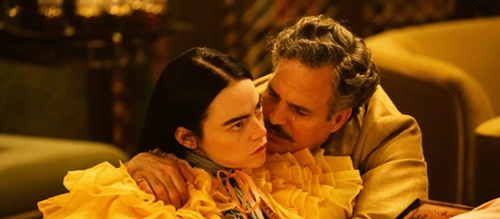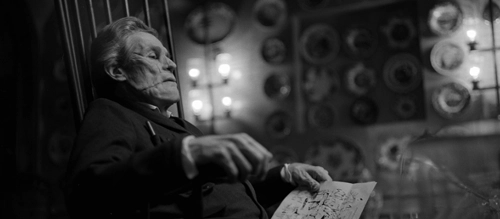Poor Things (2023) Review

Poor Things (2023)
Director: Yorgos Lanthimos
Screenwriter: Tony McNamara
Starring: Emma Stone, Mark Ruffalo, Willem Dafoe, Ramy Youssef, Christopher Abbott, Jarrod Carmichael, Margaret Qualley, Kathryn Hunter, Suzy Bemba, Hanna Schygulla, Vicki Pepperdine
Poor Things, adapted from Scottish author Alasdair Gray’s award-winning 1992 novel, is probably Yorgos Lanthimos’ most enjoyable film to date. The maverick director of such distressing work as Dogtooth and The Killing of a Sacred Deer might still be an acquired taste for many, and he has certainly lost none of his instinctive weirdness here, but this is definitely the most nakedly emotional and laugh-out-loud funny release of his two decade career.
When brilliant but reclusive surgeon Dr Godwin Baxter (Willem Dafoe) “creates” the remarkable Bella (Emma Stone), a reanimated corpse with the mind of a child, his attempts to gradually teach her about the world in a controlled environment are stymied by the sudden arrival of caddish lawyer Duncan Wedderburn (Mark Ruffalo). Wedderburn elopes with Bella on a journey around the world where an influx of countless new sensations and experiences allows for the emancipation of her mind and body from the men who would control every aspect of her newfound life.
The unique tone to be found in all Lanthimos films is something you have to get used to. From the unexplained sci-fi mechanisms of The Lobster to the intentional anachronisms of The Favourite, his worlds don’t quite operate by the same rules as our reality and the sooner you get comfortable with the absurdity of every situation and the darkly surreal turns most character interactions will inevitably take the better time you will have. If you don’t get on with the film’s monochrome first act, which is all queasy fish-eye lenses, gags involving the body and its myriad disgusting functions (including Dr Baxter’s biological need to burp expanding gastric bubbles), and creatures made up of two mismatched animals sewn together leisurely wandering from room to room in Godwin’s mansion, you probably won’t be brought on side by the bizarre sex montages, hallucinatory imagery and gallows humour that follows.
This is a heightened reality that incorporates formal social attitudes typical of the Victorian era the film is set in but also borrows much of its visual language from romantic painting and the carnivalesque films from the birth of cinema. Much like, of all things, Greta Gerwig’s Barbie (coincidentally another film about liberation from expectations of your gender) this has a delightfully hand-crafted, sometimes deliberately unreal feel to it with tactile, eye-catching sets representing fantasy versions of different places and cultures with radiant projected backgrounds, like a Georges Méliès extravaganza made with a decent budget and sophisticated modern techniques.
Divided into distinct chapters that mark stages of Bella’s journey across Europe and beyond, each with a unique colour palette and subtly different style of cinematography from Ken Loach regular DOP Robbie Ryan, the film becomes a little more grounded, more magical-realist than surrealist as she gains some understanding about society and her place in it. As Bella’s sexuality is awakened, almost simultaneously her world is thrown wide open and new stimuli rapidly accelerates her from puberty into adulthood and independence.

It’s a nice inversion of the usual tropes established in Mary Shelley’s “Frankenstein” to have the mad scientist be disfigured and his creation be perfect. As full of gravitas as Willem Dafoe is under impressive prosthetics and as entertainingly foul-mouthed as Mark Ruffalo can be with his slightly wobbly accent, this is Emma Stone’s world and everyone else just lives in it. She really is one of the most fearless and versatile actors of her generation, able to perfectly modulate the inherent uncanniness of her character while always remaining sympathetic, funny and heartbreaking. What is acceptable behaviour in the man’s world Bella Baxter is re-born into puts her at odds with how she expresses and enjoys herself. Fatherly authority Dr Baxter (or “God” as she refers to him), his protégé and Bella’s pushover fiancé Max McCandles (Ramy Youssef), and the frankly grotesque Duncan Wedderburn all represent points on the scale of patriarchal abuse who all have their own agendas and all – maliciously or not – seek to exert their authority over Bella.
One theme Lanthimos comes back to time and time again in his work, notably in Dogtooth and The Favourite, is control. Who has the power and the authority over another and when and how can that balance shift? For all that Duncan Wedderburn preaches the joy of dismissing the restrictions of “polite society”, as soon as Bella is embarrassing him in public by talking brazenly about his bedroom antics and refusing to submit to his every whim, he becomes just as much of an oppressor of her freedoms. He also begins to turn against her as her mental faculties catch up and eventually overtake his, threatening his dominance and his need to feel like he needs to protect her.
From a decidedly unconventional breakfast table masturbation scene onwards, Bella becomes a joyfully sexual and uninhibited creature, always voicing her wants in the moment whether appropriate or not, gorging on the most delectable food and dancing with wild abandon. She is a big fan of “Furious jumping” as much as possible to the extent that on her arrival in Paris she sees the prospect of sex work to pay her way an opportunity rather than an indignity. Lanthimos is unabashed at portraying Bella’s sometimes elaborate sex scenes but they are usually joyous, sex-positive affairs that never feel exploitative.
Poor Things is a gloriously against-the-grain comic fantasy that skewers 19th Century sexual politics and particularly the inequalities and prudish attitudes that persist to this day. We need a few more Bella Baxters in this world; curious, resilient and determined to break free from the limitations still imposed by our lingeringly patriarchal society. Yorgos Lanthimos and his creative collaborators have together crafted a strange and wonderful twisted fairy tale that makes us question our limitations, our hangups and our treatment of others.
Score: 23/24

